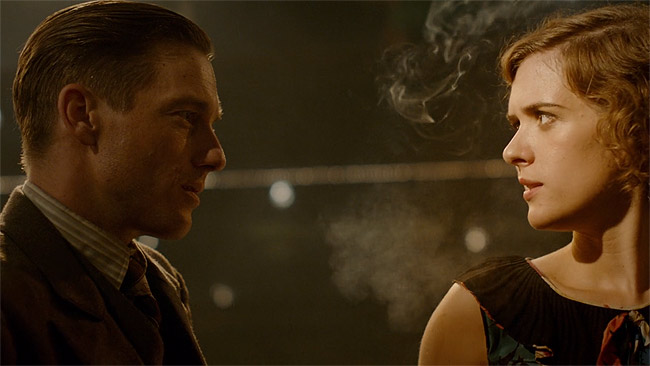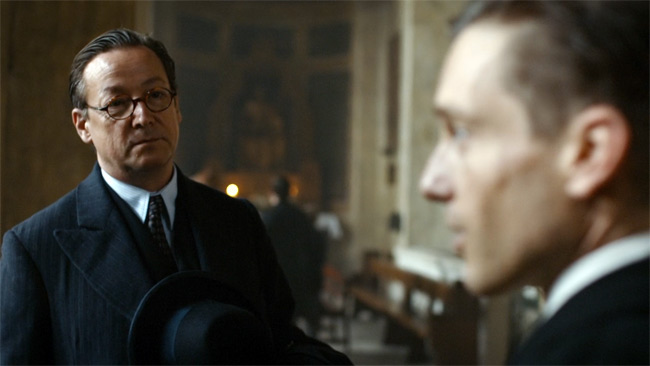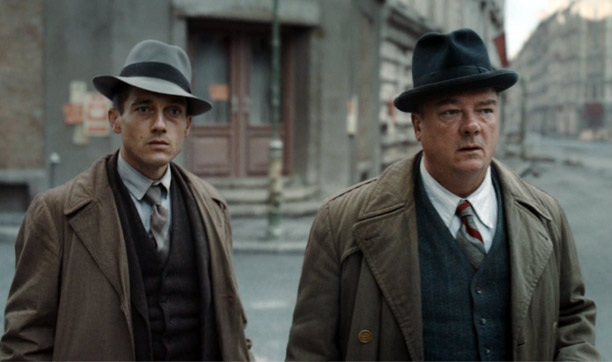‘Germany, be on your guard! The spirit of Berlin is a demon.” So warned the reactionary Swabian author Ludwig Finckh in the fateful year of 1919. Finckh was among the many Germans who were from the outset implacably hostile to the Weimar experiment in liberal democracy and bitter toward the social democrats for the purported “stab in the back” that had killed their beautiful Reich. To Finckh, there was no city for which the historical trajectory was more concerning or tragic than Berlin. Once the mighty Prussian capital and heart of a continental power, the city would become the epitome of interwar cosmopolitanism, a hotbed of radical left-wing agitation, home to the latest consumer trends from Paris and Vienna, and even—Gott, steh uns bei!—jazz music.
Finckh may just have been one in the long line of cranky German conservatives unequipped for the fast life of a modern European capital, but his writing is illustrative of some of the widespread resentment in response to the rapid social change and inequality of the Weimar era. This period began with a democratic revolution against the kaiser at the end of World War I, a revolution that many leading generals conveniently permitted so as to avoid facing blame for Germany’s impending defeat. The catastrophic inflation of the immediate postwar era famously saw families paying for necessities with wheelbarrows of paper currency. After economic stabilization measures were implemented in 1923, Germany enjoyed a few brief years of prosperity—albeit with persistent inequality—during the Goldene Zwanziger or “Golden Twenties,” only to once again fall into depression after the Wall Street crash of 1929. During this time, democracy failed—or rather, it succeeded while liberalism died a quick death—and the Nazis made unimaginable gains in the 1932 elections before Hitler took the chancellery the following year.
This 30,000-foot view is the one with which most of us are familiar; it is usually discussed cursorily in the first few pages of any history of World War II, treated as the prelude to the more consequential history. What a shame. There was perhaps no more dynamic a society in 20th-century Europe than that of Weimar Germany. The short-lived Golden Twenties were defined by contradictory forces in all realms of society: Politically, there was competition between extremists on the left and right, spilling blood in the streets and attempting to win the hearts of the same electorate, the same neighborhoods, often recruiting members of the same families. Art was distinguished by the anti-realism of German expressionism and the Dadaists’ embrace of absurdity, a striking juxtaposition to the quintessentially rational aesthetic of Bauhaus. It was an era when successful new corporations popped up all over the country, promising consumers unprecedented prosperity buoyed by the new Reichsmark while at the same time the socialist agitprop of Bertolt Brecht and the dystopias of Fritz Lang dominated theater and cinema. It was the best of times, it was not yet the worst of times.
The Golden Twenties and its contradictions do not feature much in popular culture on either side of the Atlantic—certainly not as much as Germany’s Very Dark Thirties and Forties do—which may help explain why the new series Babylon Berlin, set in 1929, has become an international sensation. The German-produced show, which reportedly cost more per episode than any other non-English-language TV drama ever made, premiered last year in Germany and has been picked up for distribution in many countries, including by Netflix in the United States. Sixteen episodes have been made so far; more are in development.
In addition to the show’s setting, Babylon Berlin is noteworthy for its high production quality—comparable to the best American and British TV dramas—its nail-biter of a plot, and its dazzling aesthetic (one of the show’s creators is Tom Tykwer, director of the psychedelic thriller Run Lola Run). The noir drama is loosely based on a series of novels by Volker Kutscher following the adventures of Gereon Rath, a Cologne detective and deeply traumatized WWI veteran who is sent to Berlin on a special assignment that lands him on the vice squad. His mission, we learn, is to investigate a sophisticated blackmail plot targeting the Cologne mayor (and future German chancellor) Konrad Adenauer. Rath is played by Volker Bruch, whose carefully controlled face and perpetually baggy eyes manage to convey youth and age at once with restrained intensity.

Charlotte Ritter (played by Liv Lisa Fries) is Rath’s unofficial partner and the quintessential Weimar precariat. Ritter wishes to translate the political emancipation of the era (women’s suffrage having been introduced in Germany’s 1919 constitution) into professional achievement by becoming Berlin’s first female homicide detective. Her ambitions lead her into constant conflict with the pervasively misogynistic culture of the German bureaucracy, requiring her to take menial and irregular clerical jobs with the police as she turns tricks at the cabaret at night to feed her slum-dwelling family.
In the opening scenes of the first episode, we see a train hijacked and then sent to Berlin from Russia under mysterious circumstances. The train’s contents remain a mystery to most of the characters until the end of the season, with rumors swirling that it carries poison gas or gold. The locomotive attracts the interest of Trotskyite exiles, the Soviet secret police, a cruel mob boss known as “The Armenian,” and the Black Reichswehr—a shadowy paramilitary cell within the army that seeks to rebuild Germany’s military in contravention of the Treaty of Versailles. A deadly competition for its cargo develops while the Berlin police, save for Rath and Ritter, step back from the matter at the behest of shady officials in President Hindenburg’s office.
The series was mostly shot on-site in Berlin, with digital effects used for establishing shots of the prewar Mitte district downtown, as well as a full-scale replica of the old police headquarters, the famous “Red Castle” in Alexanderplatz (now a shopping center, a fitting tribute to the End of History in the heart of what was once East Germany’s plaza dedicated to socialist achievement). The show brings the city to life, and we find in Berlin a menagerie of radical ideologues, of disaffected young people itching for violence in the name of some higher calling who nonetheless generally manage to coexist day to day. The onslaught of what everyone calls “modern” simultaneously enthralls and enrages those radicals looking for an escape from the ennui—or injustice, depending on who you ask—of social democracy. Proto-fascists and Trotskyites harangue against bourgeois excess even as they frequent the same jazz clubs and bordellos bedecked with the latest French chic, commingling with their ideological adversaries in dancing, drinking, cross-dressing, and all manner of debauchery before returning to their cellars to plot their respective coups and revolutions.
What might be Babylon Berlin’s greatest achievement is its relatively understated depiction of the rise of fascism. The show does not need to constantly remind its viewers of the impending doom. Hitler—who in 1929 was still busy building up the Nazi party’s base—is mentioned casually in one episode; a few swastikas can be seen on street posters in the background, although their numbers are always dwarfed by those of Communist or socialist or sundry right-wing groups; and it is not until the penultimate episode that we first see Brownshirts, in this instance harassing a politician at an U-Bahn station for having a Jewish mistress. The show’s creators so deftly capture the zeitgeist of political dysfunction in every aspect of the show that the Nazis hardly ever have to be mentioned by name for the viewer to understand that this society was one of newfound but ephemeral freedom preceding more than a decade of totalitarianism.
All this makes Babylon Berlin a valuable contribution to popular history of the period: It is far more interesting for Germans and Americans alike to watch a series about interwar Germany that revolves less around the Nazis than around the proto-Nazis—the monarchists in the old Prussian officers’ corps, the proud veterans’ groups denouncing the feckless Social Democrats, the average pilsner-swigging day laborers who could just as plausibly become members of the Third International as they could Brownshirts. These groups all abetted Hitler’s rise in some way and most embraced the Führer and his millenarian vision once the Nazis had come to power. But as of mid-1929, very few of them were self-avowed National Socialists. In the 1928 German federal election, the Nazi party took a mere 2.6 percent of the vote.
The Germany we see in Babylon Berlin is more frenetic and eclectic than it has ever been; it is a far cry from any monolithic fascist culture. At the same time, “all these Nazis did not just fall from the sky,” as one of the show’s producers said in an interview. We viewers know that the writing is on the wall; we can see the sources of the coming nightmare in the shots of disabled veterans on every street corner, in the conversations that make casual mention of the “traitors” who threw Germany to the wolves at Versailles, and in the self-assuredness with which the democrats in Berlin note that the Communists are the only political force that poses any significant threat to German democracy.

The subtlety of the creators’ approach lends itself to characters more complex than those of the typical cop drama. For example, a brief shot of a menorah in the home of August Benda, head of the Berlin Political Police, immediately compels the viewer to sympathize more with a heretofore controversial figure. Indeed, Benda—played by Matthias Brandt, son of Willy Brandt, the former mayor of Berlin and West German chancellor—may be the most compelling character of the series. For all his many flaws (he oversees the coverup of a bloody crackdown on Communist protesters on May Day), he is one of the show’s few idealists whose beliefs are not liable to beget mass murder. In a period we associate with interminable violence between Communists and fascists, it is fascinating to see the embodiment of the Weimar liberal and to find him simultaneously both so sympathetic and naïve. A Social Democrat committed to adhering to the terms of Versailles and prosecuting right-wing cells in the state apparatus, Benda spends the season doggedly pursuing the Black Reichswehr with Rath and Ritter while most of his colleagues opt for a “see-no-evil” approach. He is loathed by monarchists, fascists, and Communists alike, and, as we discover when his Jewish background is revealed, he has the most to lose should his country succumb to fascism.
But his mission is not simply one of self-preservation. Benda and his photogenic family embody the Weimar ideal: increasingly attainable bourgeois comfort; empathy for the most vulnerable in society balanced by an emphasis on personal agency that lends itself to democratic meliorism; and a strong faith in assimilation, secularism, and civic nationalism. These are ideals he is prepared to fight for. We know he will ultimately fail. The viewer’s hope is that the tragedy of his vision is not compounded by a tragic end for him and his family as well.

The antithesis of Benda is Bruno Wolter, Rath’s new partner in the vice squad and another compelling if disturbing character. A large and gregarious Berliner, Wolter’s disarming sense of humor hides his frightening political convictions and cold moral calculus. Wolter (played by Peter Kurth) is connected to right-wing putschists and shows no qualms about murder or extorting prostitutes. He is an ardent believer in the Volk and in his own community of WWI veterans. Within this community egalitarianism and camaraderie abound. Wolter cares for his dementia-afflicted wife tenderly and acts as a father figure to the children of those men from his unit who never made it home. But anyone outside this tightknit society is treated with suspicion, if not hostility. Rath learns this the hard way, and soon the two partners are secretly chasing one another as part of the unfolding intrigue that keeps the viewer eager to start the next episode and—after the explosive finale—the next season.
For all its edifying value, Babylon Berlin is also simply fun to watch. It has all the elements of a good crime drama as well as the angst we would expect of German cinema, and we can shrug off what might be its only glaring flaw—the absurdly stylized action scenes—as a matter of taste if not a self-aware ode to classic Hollywood. If an academic history seems too dry or an Alfred Döblin novel too inscrutable, Babylon Berlin offers a digestible and entertaining introduction to the intriguing Weimar era.
